Four Days in June Read online
Page 21
The cannonball hit the man at a height of around five feet, four inches, travelling at 800 miles an hour. It took off his head. Or rather, it smashed it to a bloody pulp and, covered with his brains, went on to hit the man directly behind him square in the chest. Passing through him like a knife through butter, it entered the third rank man to his rear, disembowelling him before crushing the groin of the unfortunate ensign who happened to be standing at the rear of the company. Now slightly deflected by its collision with bone, it continued to travel away from the screaming officer before finding a home in the next battalion, where it fell on the head of a sheltering drummer boy, crushing it quite flat, before rolling away into the mud, its mischievous force finally spent.
It was not the most destructive roundshot that De Lancey had ever seen. A cannonball at Salamanca had passed high over his own saddle before killing and wounding no less than twenty men of the 27th in a similarly bloody fashion. The added effectiveness then had been due to the gunners’ ability to exploit the fact that on hard ground roundshot would bounce like a giant cricket ball. Here though, thankfully, the mud had annulled such a technique. Nevertheless the shots were still telling. He looked at the bloody swathe the missile had left in its wake. At the headless and eviscerated corpses. At the whimpering, pitifully emasculated young officer who had now been picked up by four soldiers and was being carried with due deference to the field hospital at Mont St Jean farm. As De Lancey watched, the dead were hauled out of the ranks and the files closed up as if nothing had happened. The regimental sergeant-major, granite-faced, muttered just one word: ‘Steady.’
De Lancey turned back to face the enemy.
For ten minutes now the French cannon had been belching smoke and flame across the valley. It was a display of artillery power whose like he had never seen. Eighty guns – six, eight, twelve pounders – lined along a small spur on the eastern side of the battlefield. A battery of such prodigious firepower that its smoke now not only obscured the army assembled behind it, but also seemed to threaten to blot out the very sun itself. He turned to Basil Jackson.
‘Damn this fire. How much longer will they keep it up? Look at the men. Our lads can take it. But have you seen the Hanoverians? D’you think they can stand much more?’
‘The Peer seems cool enough about it, De Lancey.’
‘The Peer always seems cool, Basil. But what he shows to us and what he really feels are quite different.’
Ahead of him and slightly to the left, Wellington sat astride Copenhagen, his eyeglass pressed close to his cheek. Lowering it, he turned to De Lancey.
‘I think we might expect something now, De Lancey. D’you see how they are moving their caissons aside. I believe they mean to attack us.’
De Lancey raised his own telescope. Wellington was right. There was something happening behind the extended gun line. The hundreds of ammunition caissons which had hitherto been parked in three long lines behind the guns were being moved together into long columns. Columns which would allow bodies of troops to pass between them in single file. Wellington continued:
‘Tell Picton to be ready to meet them. But tell him to keep his men lying down until the last possible moment. Or until the guns cease. And have him move those Dutch and Belgians back from the lower slope. They’ve taken enough of a pounding.’
It was true. They had all watched in horrid anticipation as shortly after midday the French had begun to lug the great cannon into place on the rising ground. Such a battery was one of Napoleon’s favourite tactics. And always the prelude to an attack in force. It had taken over an hour before the battery was ready. The guns were extraordinarily close to the Allied lines, he thought. No more than 700 yards. Close enough for him to observe quite clearly, with an almost clinical objectivity, the individual gunners as after each shot they laboured to move the great ton-heavy cannon back into position, before sponging out the barrels, reloading and taking aim. Then he was able to follow the arc of the ball as it flew from the smoking mouth of the gun towards the ridge, sometimes for a full two seconds before it struck.
Here on the right of the line, save for the regiments positioned directly behind the farm, chiefly the German Legion, they had not yet suffered too badly. On the left, where Picton’s division supported the Hanoverians, the toll appeared to be heavier. It was hard, though, to tell the dead from the living, for all were lying down. It was a trick that Wellington had used much in Spain and of whose effectiveness the late roundshot had just proven a grizzly reminder. Yet for the most part the cannonballs were flying too high to make their mark. The majority of the casualties were being caused by French shells which, bursting over the heads of the recumbent infantry, sent down a lethal rain of red-hot metal. Such had been the disturbed nature of the night that often the exhausted men were simply dying in their sleep, apparently unaware that they had been hit. De Lancey turned in the saddle. Found Will Cameron.
‘William, ride to Sir Thomas Picton. Tell him that his Grace believes that the French are about to attack. He should make ready. Tell him to keep his men in cover until the last possible moment. And ask him to move Bylandt’s men beyond the crest.’
As the young officer sped off, De Lancey turned back to Wellington and, with the rest of the entourage, followed him as he began to make his way along the ridge towards what he perceived would be the focus of the coming attack.
They passed a battery of British artillery. Its commander, a ruddy-faced young captain, rode up to the Duke.
‘Your Grace. I beg you, allow the artillery to engage the enemy batteries. Our men are suffering horribly.’
‘I have specifically ordered, sir, that our cannon should not exchange fire with the French. Such a duel is ineffective and costly. We will reserve our ammunition for the infantry, when they come. I’m very much afraid that the men will simply have to bear it.’
Almost as he spoke a shell burst above their heads, thirty yards over to their right. All save Wellington ducked. De Lancey watched a larger than average piece of the exploding iron ball fly from the sky and cut a company sergeant-major clean in half.
At the same instant a shout came from directly behind them. Turning round he saw that another shot had hit a large tree and cut it through, causing the tip to fall on top of a first aid post which two surgeons had recently established beneath its boughs. They were now attempting to extricate themselves from the fallen branches. What a farcical contrast, he thought, to the carnage all around them. But that surely was what a battlefield was about. A place whose very essence was absurd, which in turn invited episodes of absurdity. It was clear from the effect on the tree that the French had raised their angle of fire. And that could mean only one thing. Instants later De Lancey began to make out the small black dots of men emerging from the landscape before him to the left of the chaussée directly opposite Picton’s line. French tirailleurs and voltigeurs. Skirmishers advancing ahead of the main force. He watched as they approached the comparatively sparse Allied skirmish line. As the puffs of smoke marked individual dramas where men stood or fell. Then, while the rifles continued to fire, he saw the blue-coated Belgian skirmishers turn away from the advancing French. Watched as French light troops approached the farmhouse of La Haye Sainte, engaging Baring’s German Legion riflemen in the buildings.
And then quite suddenly the cacophany, which for half an hour had rent the air, just stopped. He could still hear the popping of the skirmishers’ muskets. But as one, the cannon had fallen silent. A new sound now took the place of their vile roar. An insistent, rhythmic beat which seemed to come from the very base of the valley. He knew it instantly.
Rum dum, rum dum, rummadum, rummadum, rum dum.
Again.
Rum dum, rum dum, rummadum, rummadum, rum dum.
The pas de charge. The heart-stopping sound that the veterans called ‘old trousers’. The familiar Peninsular tattoo of French infantry making their approach march. Two hundred drummers beating out the death knell. De Lancey felt his stomach tighten
into a knot; his throat grow dry. Now he could see the columns quite clearly. The sun glinting off sixteen eagles bobbing with their standards high above the blue masses. Quickly he counted them. Two hundred men wide; perhaps twenty deep. He saw officers dancing round and round in front of the men; urging them on. Drummers lifting and lowering their sticks. Men hurling shakos into the air. The very glory of France, it seemed, was marching towards him. It did not take the columns long to descend the slope. And once they were beneath the crest, the guns above began again. The balls came in high and fast, at the height of a cavalryman or mounted officer. Tellingly, one made contact with the outer edge of the Duke’s staff, carrying away the upper torso of a teenage bugler seconded from the dragoons, along with the front portion of his horse’s head.
De Lancey concentrated on the sight to his front. How slowly they are coming on, he thought. It is the mud.
An officer of horse artillery rode up. Saluted Wellington. ‘Your Grace. Napoleon and his staff are in range. I have a clear view, sir. May I have your permission to try a shot?’
‘Certainly not. I will not allow it. It is not the business of commanders to fire upon each other.’
‘Are they trying to frighten us from the field?’
It was d’Alava. Wellington touched his hat to the Spaniard.
‘My dear Count. I have never left a battlefield on account of the noise and I do not intend to do so now.’ He turned to the commander of the allied artillery, Augustus Frazer. ‘You may have the artillery give fire now, Frazer. At the infantry, mark you.’
Wellington caught De Lancey’s eye. ‘This one’s going to need careful timing.’
Three minutes later, all along the Allied ridge, thirteen batteries – seventy guns – opened fire.
There was cheering from the furthest advanced of the Allied infantry.
‘De Lancey. With me.’
Wellington was galloping eastwards. As De Lancey caught up with him, he began to issue orders: ‘Tell Colonel Ompteda to send the First Light Battalion across the highway in support of the rifles. And have the Prince of Orange order down a battalion of Hanoverians to reinforce La Haye Sainte. Be sure to tell him to watch out for cavalry.’
No sooner had De Lancey despatched Abercromby with the Duke’s instructions than they were reining in their horses behind a low hedge close to the 79th – the Cameron Highlanders. The regiment’s huge colour of green silk with its distinctive central garter and saltire fluttered above them alongside the Union flag. For although the men were lying down as ordered, above them, enclosed by a ring of pipers, their colour party still stood, while the ancient regimental tune, the ‘Cabar Feidh’, skirled out over their heads. It provided an accompaniment for the unsettling vignette which now greeted De Lancey as he looked back towards the Allied right wing, across the Brussels road.
The Prince of Orange, distinctive in his black and sky blue, was in the process of delivering an order. His second-in-command, the respected veteran Constant-Rebecque, appeared to be arguing with his master. There was an outburst. De Lancey saw a rider being sent down the ridge towards Kielmansegge’s Hanoverians. Seconds later the battalion was advancing down the slope towards the farm. And there it halted. In column. What the deuce was the Prince up to? De Lancey looked to Wellington. But the Duke was preoccupied with developments on the left flank. Neither he nor Kielmansegge saw the mass of French infantry approaching the farmhouse, or the cuirassiers protecting their flank. Nor presumably, lacking the height of his position, could the Hanoverians themselves. Yet if they did not form square they would be cut to pieces. And, tied as he was to the Commander-in-Chief, there was absolutely nothing De Lancey could do about it. He looked for an aide but found no one. A commotion made him turn round in the saddle, back towards Picton’s line. Hundreds of blue-coated Belgians and Dutch were walking towards him back up the hill, towards the rear. Some hideously wounded. This was Bylandt’s brigade, which, positioned on the forward slope, had borne the brunt of the fire. Men whom only last year, he pondered, had been loyal to the man who now commanded on the other side of the valley. Even more worryingly, though, with them came the green-jackets of the 95th, forced from their strongpoint in a roadside sandpit by sheer weight of numbers. Further left he was able to see that one of the French columns was now engaged in a firefight with the remaining line of Bylandt’s men. And then the Dutch broke. Turned and fled back through the gap between Kempt and Pack. A single Belgian battalion remained alone on the crest to hold back the rising blue tide. A great cheer went up from the advancing French. To them, De Lancey supposed, the ridge must seem almost deserted now. He peered down the line of British regiments. Along the hedge, to where Picton’s men, the Peninsular veterans of Kempt’s and Pack’s brigades, who two days ago had suffered so at Quatre-Bras – the Highlanders, the 28th (the ‘Slashers’), the Royal Scots – still lay in the shoulder-high corn. Waiting with stoic patience for the command.
The Allied artillery had now switched their load to canister. Eighty-five one and a half ounce solid iron balls, packed tightly into a tin cylinder, primed to explode in an expanding cone of destruction. They were tearing bleeding holes in the French columns. But still the eagles came on. He could hear the drum beats closer now and quite clearly the cries of ‘Vive l’Empéreur’. All along the line British and Allied artillerymen began to run back from their guns to the shelter of the battalions.
De Lancey turned to Wellington. ‘Here they come, your Grace. But I think we shall have them.’
‘Indeed, De Lancey. That would seem to be the case.’
De Lancey could feel the ground tremble under the feet of the 16,000 men advancing up the slope directly towards him. His horse pawed nervously at the mud.
Wellington turned to Kempt: ‘What d’you say to this, Sir James?’
‘We’ll see them off, your Grace.’
‘Up with your men then. Have them rise up.’
All around him officers and sergeants barked the command.
‘Rise up the 32nd.’
‘28th, stand up.’
‘Make ready.’
And from the ground, like an army of spectres, 3,000 redcoats rose as one, formed rank and, on the order, presented their muskets.
The French, having crested the hill on the tail of the fleeing Dutch, stopped still. Their complete surprise at being confronted by a line of British infantry was palpable.
‘Fire!’
The echoing command ran down the line of Kempt’s brigade like quicksilver. Every musket crashed out. The French columns froze, and from further east another massive volley echoed the first as Pack’s brigade opened up. As the smoke cleared De Lancey could see the extent of the carnage. The entire French front rank had crumpled to the ground. Bodies lay everywhere. He saw officers retrieving eagles from fallen colour-bearers; wounded and dying men clawing at the earth in their agony. The second rank was attempting to load. Desperate hands fumbling with priming pan, flint and cartridge. Men dropping ramrods. Trying to find the space to present. All too late. For in the densely packed columns, even in this new formation, the fronts were just too short. A mere 500 able to fire against the thousands that now opposed them. Again the British muskets crashed out, and above them now came another sound, as the pipers of the three regiments of kilted Highlanders, the Camerons, the Gordons and the Black Watch, took up the high-pitched wail of their regimental battle tunes.
Now, thought De Lancey. Now we will finish them with the bayonet.
To his left he heard Sir Thomas Picton’s great bellowing voice take up his thoughts as he shouted through the cacophany, waving his furled umbrella in the air, like a great black sword. ‘Charge, boys. Hurrah! Hurrah!’
De Lancey saw the Welsh commander motion to his aide, Horace Seymour, to give the order to advance.
Picton looked about. Found Kempt. Shouted. ‘Rally the Highlanders.’
His face set, he twisted again to face the enemy and suddenly started up in the saddle as a musket ball tore open the cr
own of his black top hat. De Lancey watched the general’s lifeless body slump forward and fall from his horse.
Wellington’s voice, apparently oblivious to the tragedy, drew him back to his senses. ‘I am needed, De Lancey. The 79th.’
The Duke swept past to the left and De Lancey followed, towards where the Cameron Highlanders had advanced and were trading fire with a French battalion which had formed up across the road at a range of a mere twenty yards. For once the French appeared to be having the better of it. Wellington made sure that enough of the shaken Highlanders could see him before shouting a general command. ‘Now, 79th. Give them a volley. Go to it.’
The Peer’s presence, thought De Lancey, was enough to turn the faintest heart. All thought of flight now gone, the Camerons loaded at a furious pace and sent their fire into the French ranks. As the blue column recoiled, Wellington smiled.
‘That will do.’
He turned Copenhagen towards the right flank and cantered away across the highway, pursued by the staff. As they reached the elm tree behind the farm, De Lancey pulled up his horse.
To the right of the farmhouse the ground at the foot of the ridge was speckled with red-coated German corpses, while up the hill streamed the unformed rabble of the men sent down on the Duke’s orders by the Prince of Orange. With them scrambled what was left of the green-coated battalion of the German Legion that had gone to their aid. Through the smoke De Lancey could see the remainder of Ompteda’s and Kielmansegge’s battalions formed up on the ridge in squares. The majority of the fugitives seemed to have found refuge in their ranks. Down in the orchard of the farmhouse he could also make out dozens of figures in blue and white. The French had taken the gardens, surrounded the buildings and were attempting to climb the walls.
Wellington looked to the left and right. ‘Uxbridge? Where is the man?’
Resplendent in the uniform of a Hussar colonel, the commander of the Allied cavalry cantered up to the staff. ‘Your Grace?’

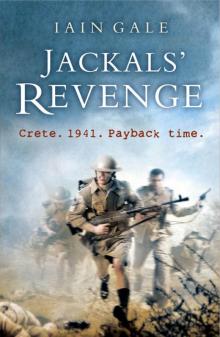 Jackals' Revenge
Jackals' Revenge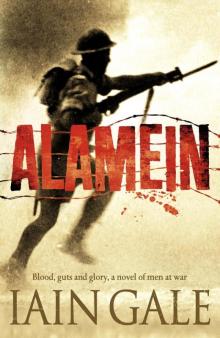 Alamein
Alamein Conspiracy
Conspiracy Four Days in June
Four Days in June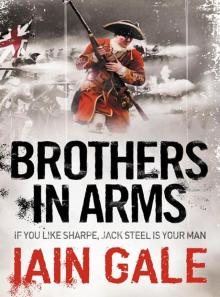 Brothers in Arms (Jack Steel 3)
Brothers in Arms (Jack Steel 3) Brothers in Arms
Brothers in Arms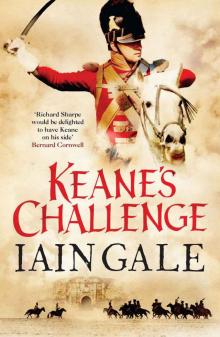 02 - Keane's Challenge
02 - Keane's Challenge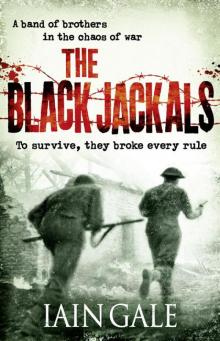 The Black Jackals
The Black Jackals Man of Honour
Man of Honour Rules of War
Rules of War